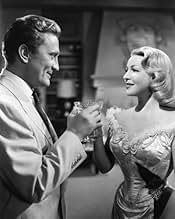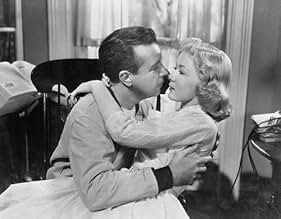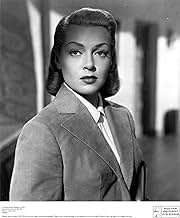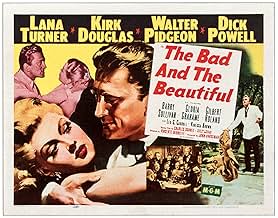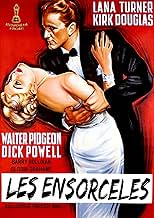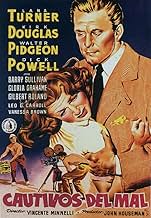VALUTAZIONE IMDb
7,7/10
17.342
LA TUA VALUTAZIONE
Un produttore cinematografico senza scrupoli utilizza un'attrice, un regista e uno scrittore per raggiungere il successo.Un produttore cinematografico senza scrupoli utilizza un'attrice, un regista e uno scrittore per raggiungere il successo.Un produttore cinematografico senza scrupoli utilizza un'attrice, un regista e uno scrittore per raggiungere il successo.
- Regia
- Sceneggiatura
- Star
- Vincitore di 5 Oscar
- 7 vittorie e 7 candidature totali
Jay Adler
- Mr. Z - Party Guest
- (non citato nei titoli originali)
Stanley Andrews
- Sheriff
- (non citato nei titoli originali)
Del Armstrong
- Georgia's Makeup Artist - Screen Test Scene
- (non citato nei titoli originali)
Ben Astar
- Joe - Party Guest
- (non citato nei titoli originali)
Barbara Billingsley
- Evelyn Lucien - Costumer
- (non citato nei titoli originali)
Recensioni in evidenza
Winning an Oscar has nothing to do with the amount of on screen time, so the shortness of Grahame's role does not bother me. However, her cartoonish interpretation of a Southern Belle is simply not worthy of an Academy Award, especially when the role is intended to be seriously dramatic. Jean Hagen most certainly deserved the Supporting Actress honor for her APPROPRIATE comedic turn as an over-the-top, unfortunately voiced silent film actress in "Singing in the Rain." And, folks, that scene with an hysterical Lana Turner driving in the rain is, well, HYSTERICAL.
VM was an excellent director, but some of his films, especially the overwrought melodramas, simply do not hold up. Yes, they always look great, but often the performances in the dramas are of the scenery-chewing variety.
In regards to another user's post, I agree that the scenario of Powell's character identifying his wife is ridiculous. The same thought immediately crossed my mind when seeing it for the first time.
My feelings towards Douglas's performance are mixed. At times he hits the mark, but at others, it is pure ham.
The film is definitely worth seeing, but it does not deserve the status of "classic." Its presentation of the industry is clichéd. As others have stated, "Sunset Boulevard" blows this film out of the water.
VM was an excellent director, but some of his films, especially the overwrought melodramas, simply do not hold up. Yes, they always look great, but often the performances in the dramas are of the scenery-chewing variety.
In regards to another user's post, I agree that the scenario of Powell's character identifying his wife is ridiculous. The same thought immediately crossed my mind when seeing it for the first time.
My feelings towards Douglas's performance are mixed. At times he hits the mark, but at others, it is pure ham.
The film is definitely worth seeing, but it does not deserve the status of "classic." Its presentation of the industry is clichéd. As others have stated, "Sunset Boulevard" blows this film out of the water.
During this time in the early 50s there were quite a number of Hollywood pictures which scrutinised and often satirised Hollywood itself. The old studio system had been seriously weakened in the war years, the young crop of independent producers and writer-directors were gaining ever more prominence, and the dream factory as a whole had become a little more introspective, not to mention cynical. But while Sunset Boulevard, All About Eve (about the theatre, but the point carries through) and Singin' in the Rain aimed their sights at the injustice and hypocrisy of the star system, The Bad and the Beautiful takes on the thorny issue of creative control.
The Bad and the Beautiful is referenced extensively in auteurist Martin Scorsese's 1995 documentary on American movies, as an explanation of the antagonism between a producer's commercial drive and a director's artistic one. However it is far from a validation of auteur theory, for while it emphasises the importance of the director's role, it also points out (quite correctly) the equally crucial contributions of the writer and the producer himself. Incidentally the actual producer of The Bad and the Beautiful is John Houseman, primarily an actor who really only dabbled (albeit quite successfully) in production, and thus someone who could perhaps afford to snipe from the sidelines. Oddly enough screenwriter Charles Schnee would also turn to producing soon after this. He certainly shows extensive insider knowledge of the industry.
The director of The Bad and The Beautiful is Vincente Minnelli, a man whose flowing and extravagant style was put to best use in the musical genre, and although he was certainly competent in drama he does tend to overdo things a little for the form. One typically impressive Minnelli manoeuvre is the lengthy tracking shot at the party about fifteen minutes in, in which the camera is "carried" from one character to the next, while the careful arrangement of extras draws our eyes from one point of focus to another, a woman singing beautifully yet unnoticed in one corner, while a gossipy starlet is surrounded by a gaggle of admirers in another. Minnelli's tendency to keep all the characters in shot together during dialogue scenes means there is no need for back-and-forth editing. When there is a cut it is a meaningful jump, such as the close-up when Sullivan is told he won't be directing Shield's first big picture. Ultimately though the elaborate nature of Minnelli's direction is disproportionate to the needs of the picture, and a more stripped-down approach could have intensified the drama.
Another lesson The Bad and the Beautiful teaches us, both through its plot and its own example, is the importance of the right actors in a production. The majority of players in this large ensemble cast tend towards a uniform competence. People like Walter Pidgeon, Barry Sullivan and Vanessa Brown give steady, solid performances, not outstanding but apt to their characters. Dick Powell has a neat writer-ish cynicism to him, and it is only him and the vivacious Gloria Grahame that threaten to steal the show. A gratingly melodramatic Lana Turner is the only conspicuously bad player. However at the heart of The Bad and the Beautiful lies the powerful turn by Kirk Douglas. Douglas plays Shields with the mix of realism and exaggeration of a larger-than-life character, capturing the producer's boyish enthusiasm and exposing his inner fragility in a way that draws attention and lingers in the mind.
And it is here that we can see the picture's real worth. It is all very well making an accurate and incisive behind-the-scenes study of Hollywood's methods and morals, but to have any point the picture should also be an engaging and entertaining piece of storytelling. The Bad and the Beautiful is not especially romantic or funny or suspenseful, and yet it was a big hit, being the second-highest grossing picture of 1952. It seems the best thing this picture has going for it is the very character of Shields himself, who as written by Schnee and played by Douglas is both a fascinating and, yes, sympathetic individual. And the overriding message seems to be that, while producers tend to be a rather dysfunctional lot, it is their drive and efficiency that is behind many of the best things in movies. The picture's original title Tribute to a Bad Man is eminently better than the one it got saddled with. Jonathon Shields is clearly not a nice person, but through its compelling portrayal The Bad and the Beautiful salutes him.
The Bad and the Beautiful is referenced extensively in auteurist Martin Scorsese's 1995 documentary on American movies, as an explanation of the antagonism between a producer's commercial drive and a director's artistic one. However it is far from a validation of auteur theory, for while it emphasises the importance of the director's role, it also points out (quite correctly) the equally crucial contributions of the writer and the producer himself. Incidentally the actual producer of The Bad and the Beautiful is John Houseman, primarily an actor who really only dabbled (albeit quite successfully) in production, and thus someone who could perhaps afford to snipe from the sidelines. Oddly enough screenwriter Charles Schnee would also turn to producing soon after this. He certainly shows extensive insider knowledge of the industry.
The director of The Bad and The Beautiful is Vincente Minnelli, a man whose flowing and extravagant style was put to best use in the musical genre, and although he was certainly competent in drama he does tend to overdo things a little for the form. One typically impressive Minnelli manoeuvre is the lengthy tracking shot at the party about fifteen minutes in, in which the camera is "carried" from one character to the next, while the careful arrangement of extras draws our eyes from one point of focus to another, a woman singing beautifully yet unnoticed in one corner, while a gossipy starlet is surrounded by a gaggle of admirers in another. Minnelli's tendency to keep all the characters in shot together during dialogue scenes means there is no need for back-and-forth editing. When there is a cut it is a meaningful jump, such as the close-up when Sullivan is told he won't be directing Shield's first big picture. Ultimately though the elaborate nature of Minnelli's direction is disproportionate to the needs of the picture, and a more stripped-down approach could have intensified the drama.
Another lesson The Bad and the Beautiful teaches us, both through its plot and its own example, is the importance of the right actors in a production. The majority of players in this large ensemble cast tend towards a uniform competence. People like Walter Pidgeon, Barry Sullivan and Vanessa Brown give steady, solid performances, not outstanding but apt to their characters. Dick Powell has a neat writer-ish cynicism to him, and it is only him and the vivacious Gloria Grahame that threaten to steal the show. A gratingly melodramatic Lana Turner is the only conspicuously bad player. However at the heart of The Bad and the Beautiful lies the powerful turn by Kirk Douglas. Douglas plays Shields with the mix of realism and exaggeration of a larger-than-life character, capturing the producer's boyish enthusiasm and exposing his inner fragility in a way that draws attention and lingers in the mind.
And it is here that we can see the picture's real worth. It is all very well making an accurate and incisive behind-the-scenes study of Hollywood's methods and morals, but to have any point the picture should also be an engaging and entertaining piece of storytelling. The Bad and the Beautiful is not especially romantic or funny or suspenseful, and yet it was a big hit, being the second-highest grossing picture of 1952. It seems the best thing this picture has going for it is the very character of Shields himself, who as written by Schnee and played by Douglas is both a fascinating and, yes, sympathetic individual. And the overriding message seems to be that, while producers tend to be a rather dysfunctional lot, it is their drive and efficiency that is behind many of the best things in movies. The picture's original title Tribute to a Bad Man is eminently better than the one it got saddled with. Jonathon Shields is clearly not a nice person, but through its compelling portrayal The Bad and the Beautiful salutes him.
One thing that I've always wondered is why no one looks at Hollywood more negatively than Hollywood itself. But whatever the reason, "The Bad and the Beautiful" pulls no punches in looking at its topic. The movie portrays some people explaining how they used to be friends of producer Jonathan Shields (Kirk Douglas) but have since turned against him. There's the director whom Shields promised a directing job but betrayed him, the writer who lost his wife to Shields's actions, and the actress whom Shields drove to madness.
I thought that one of the most effective scenes in the movie was Kirk Douglas holding Lana Turner in his arms. Here he is, this overbearing, hostile character forced to almost coddle his gorgeous female star; it might be showing how he may seemingly have exalted her, but he remains in a higher position and is merely using her and sending her into insanity. And the scene of her driving the car while completely upset elaborates on this idea.
And then, there's the writer. He and his wife move from Virginia hoping to get really big in Hollywood...until tragedy strikes. It all goes to show the disaster inherent in any industry (of course, Douglas's character exacerbates any problem). But anyway, this is a formidable part of cinema history; a precursor to movies like "The Player". Also starring Dick Powell, Walter Pidgeon and Gloria Grahame (who won Best Supporting Actress).
I thought that one of the most effective scenes in the movie was Kirk Douglas holding Lana Turner in his arms. Here he is, this overbearing, hostile character forced to almost coddle his gorgeous female star; it might be showing how he may seemingly have exalted her, but he remains in a higher position and is merely using her and sending her into insanity. And the scene of her driving the car while completely upset elaborates on this idea.
And then, there's the writer. He and his wife move from Virginia hoping to get really big in Hollywood...until tragedy strikes. It all goes to show the disaster inherent in any industry (of course, Douglas's character exacerbates any problem). But anyway, this is a formidable part of cinema history; a precursor to movies like "The Player". Also starring Dick Powell, Walter Pidgeon and Gloria Grahame (who won Best Supporting Actress).
"The Bad and the Beautiful" takes a look at Hollywood. This incisive take about how movies are made, directed by Vincente Minnelli, dares to go behind the scenes to show what goes on in the way the film industry operates. The film adaptation by Charles Schnee gives us a good idea of that unreal world of fantasy and hype.
At the center of the story is Jonathan Shields, a young man with connections to the industry. He wants to follow his father's footsteps and goes at it vigorously, making friends and enemies along the way. Jonathan discovers he can be ruthless whenever he wants. His first victim is Fred Amiel, the talented director who Jonathan bypasses in favor of a more established one. Jonathan quickly forgets the friendship Fred and his wife showed him before becoming a big producer.
Then there is there is Georgia Larrion, the boozy daughter of a famous actor. Jonathan shows how he wants Georgia to succeed in the business, personally taking care of selling her to star in his big project, only to betray her with another woman, a glamorous bit player. When Georgia discovers the truth, she flees Jonathan's mansion in a clear night that suddenly turns into a torrential downpour and loses control of the car, but she doesn't suffer a scratch!
The last victim of Mr. Shields is the Pulitzer prize winner, James Lee Bartlow, who Jonathan coaxes into leaving his academic life to adapt his own novel for the movies. James is married to the flighty Rosemary, in whom Jonathan discovers a weak link that will do anything to hobnob with the celebrities. Jonathan makes it easy for Rosemary to fall into an affair with the star of Shields' film.
When we first watched this film, it seemed much better, than on this viewing where a lot of things surface to make some of the story much weaker than before. Some viewers have compared this film with the fate of Orson Welles in Hollywood, and there are a couple of references that could be interpreted that way. Whether it was so, or not, it's up to the viewer to guess where the truth lies.
Kirk Douglas gave a strong performance as Jonathan Shields. Mr. Douglas showed he clearly understood who this man was. He runs away with the film, in our humble opinion. Lana Turner, a beautiful presence in any movie, is good, but at times she appears to be overwhelmed by the range of emotions she has to project, especially with that phony car scene.
Dick Powell and Gloria Graham put in an excellent appearance as the Bartlows. Barry Sullivan disappears after Lana shows up, not to be seen until the end. Walter Pigeon is effective as the studio head. Gilbert Roland is perfect as Gaucho, the Latin actor with a lot of charisma.
Mr. Minnelli shows he wasn't afraid to portray the industry the way we see it in the film, not a small accomplishment, knowing well how it could have backfired on him. Hollywood is not forgiving to those who dare to show its ugly side and that's when the parallel with Orson Welles problems with the system and eventual exile can be drawn.
At the center of the story is Jonathan Shields, a young man with connections to the industry. He wants to follow his father's footsteps and goes at it vigorously, making friends and enemies along the way. Jonathan discovers he can be ruthless whenever he wants. His first victim is Fred Amiel, the talented director who Jonathan bypasses in favor of a more established one. Jonathan quickly forgets the friendship Fred and his wife showed him before becoming a big producer.
Then there is there is Georgia Larrion, the boozy daughter of a famous actor. Jonathan shows how he wants Georgia to succeed in the business, personally taking care of selling her to star in his big project, only to betray her with another woman, a glamorous bit player. When Georgia discovers the truth, she flees Jonathan's mansion in a clear night that suddenly turns into a torrential downpour and loses control of the car, but she doesn't suffer a scratch!
The last victim of Mr. Shields is the Pulitzer prize winner, James Lee Bartlow, who Jonathan coaxes into leaving his academic life to adapt his own novel for the movies. James is married to the flighty Rosemary, in whom Jonathan discovers a weak link that will do anything to hobnob with the celebrities. Jonathan makes it easy for Rosemary to fall into an affair with the star of Shields' film.
When we first watched this film, it seemed much better, than on this viewing where a lot of things surface to make some of the story much weaker than before. Some viewers have compared this film with the fate of Orson Welles in Hollywood, and there are a couple of references that could be interpreted that way. Whether it was so, or not, it's up to the viewer to guess where the truth lies.
Kirk Douglas gave a strong performance as Jonathan Shields. Mr. Douglas showed he clearly understood who this man was. He runs away with the film, in our humble opinion. Lana Turner, a beautiful presence in any movie, is good, but at times she appears to be overwhelmed by the range of emotions she has to project, especially with that phony car scene.
Dick Powell and Gloria Graham put in an excellent appearance as the Bartlows. Barry Sullivan disappears after Lana shows up, not to be seen until the end. Walter Pigeon is effective as the studio head. Gilbert Roland is perfect as Gaucho, the Latin actor with a lot of charisma.
Mr. Minnelli shows he wasn't afraid to portray the industry the way we see it in the film, not a small accomplishment, knowing well how it could have backfired on him. Hollywood is not forgiving to those who dare to show its ugly side and that's when the parallel with Orson Welles problems with the system and eventual exile can be drawn.
Glossy MGM soaper has many things to recommend it, not the least of which is a surprisingly grounded, natural Lana Turner (looking great, even in ordinary jammies) playing a successful movie actress who, along with a top screenwriter and director, help producer-on-the-skids Kirk Douglas stage a comeback. Not especially revealing about Hollywood, which at this stage wasn't quite ready to unmask itself, but still engaging and intriguing. Douglas is well-cast (he spits out his lines with a terse jaw--nothing new--but he's right for this part and is commendable). Turner is a revelation and deserved at the very least an Oscar nomination for her work; the picture did go on to win Academy Awards in five categories, including Gloria Grahame as Best Supporting Actress; Charles Schnee, Best Screenplay; Robert Surtees, Best Cinematography, Black-and-White; Best Art Direction-Set Decoration, Black-and-White; and Best Costume Design, Black-and-White. Well-directed by Vincente Minnelli, the picture gets less attention than something like "All About Eve", but it's actually more entertaining. *** from ****
Lo sapevi?
- QuizAt 9 minutes and 32 seconds, Gloria Grahame's performance in this movie became the shortest to ever win an Oscar. She held the record until 1976, when Beatrice Straight won for her 5 minute performance in Quinto potere (1976).
- BlooperThe story takes place over an 18-year period, roughly 1934-1952, but the hairstyles and clothing of all the women, from beginning to end, are strictly 1952.
- Versioni alternativeAlso available in a computer colorized version.
- ConnessioniFeatured in La fine del mondo (1959)
I più visti
Accedi per valutare e creare un elenco di titoli salvati per ottenere consigli personalizzati
- How long is The Bad and the Beautiful?Powered by Alexa
Dettagli
Botteghino
- Budget
- 1.558.000 USD (previsto)
- Lordo in tutto il mondo
- 2025 USD
- Tempo di esecuzione
- 1h 58min(118 min)
- Colore
- Proporzioni
- 1.37 : 1
Contribuisci a questa pagina
Suggerisci una modifica o aggiungi i contenuti mancanti



